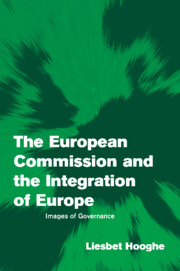Book contents
- Frontmatter
- Contents
- List of figures
- List of tables
- Preface
- Prologue
- 1 Preference formation in the European Commission
- 2 Men (and women) at Europe's helm
- 3 Images of Europe
- 4 Beyond supranational interest
- 5 Capitalism against capitalism
- 6 Principal or agent
- 7 Accommodating national diversity
- 8 Conclusion
- Appendix I Statistics
- Appendix II Description of independent variables
- Appendix III Survey material
- References
- Index
3 - Images of Europe
Published online by Cambridge University Press: 22 September 2009
- Frontmatter
- Contents
- List of figures
- List of tables
- Preface
- Prologue
- 1 Preference formation in the European Commission
- 2 Men (and women) at Europe's helm
- 3 Images of Europe
- 4 Beyond supranational interest
- 5 Capitalism against capitalism
- 6 Principal or agent
- 7 Accommodating national diversity
- 8 Conclusion
- Appendix I Statistics
- Appendix II Description of independent variables
- Appendix III Survey material
- References
- Index
Summary
It is a sticky, hot July afternoon in Brussels. My interview with the Commission director was scheduled for four o'clock, but it is now well past five. At last, the door swings open and four people leave, talking animatedly. I am waved into the room, and I switch on the tape recorder. Towards the end of the interview, I accidentally find out what kept me waiting for so long. When I ask my interviewee to define the European Union's greatest challenges, he recounts the following story:
The reason why this little meeting before the interview went on and on is that we were talking about Town X [a depressed town in Northern Europe], where we try to actually do things to help development in disadvantaged communities. I have difficulty talking about this without sounding like a twentieth-century saint – which I am not – or like a sociologist – which I am not trained to be. But I have asked a colleague to work and live there for three weeks among voluntary organizations, and this is unusual for a civil servant. She has just come back, and she paints a picture of a world in which crime, which we would all condemn, is in a certain sense the only manifestation of initiative. In fact, you can almost say that the potential for economic development of a depressed region could be expressed by its crime rate: high crime rates suggest that people still have spirit! The society is in a way flipped over; it is upside down!
One day, a television team goes to Town X, and parks its van loaded with expensive filming equipment in a quiet spot. When they return from a filming trip, the van is empty. The equipment is stolen. They get ready to drive away, when boys aged eleven or twelve – children! – jump forward and shout at the crew: “What do you pay to get your kit back?” These kids have the initiative to steal all the stuff, take it around the corner, hide it, and, not wanting to deprive the crew of the equipment, extort a price for their “protective services.” This is kidnap of the gear, not theft. Apparently the television team paid an excessive Euro 500 [approx. US $500] to get these thousands Euro worth of equipment back. I do not know whether to condemn these children or admire their sense of enterprise. It sounds to me like capitalism is alive and well in this deprived area!
The world is upside-down. We would be able to employ hundreds of people like those kids if we could think of a way of flipping society back onto its proper position. We are talking about these great disparities in wealth as a major challenge to the Community. But these wealth disparities are not, it seems to me, the most important problem. It is the fact that, in large segments of our cities and regions, people have been out of society for so long that they do not believe in society any more. They are no longer able to see how it has anything to do with them. So that is my challenge.
(Official #57)- Type
- Chapter
- Information
- The European Commission and the Integration of EuropeImages of Governance, pp. 67 - 92Publisher: Cambridge University PressPrint publication year: 2002



